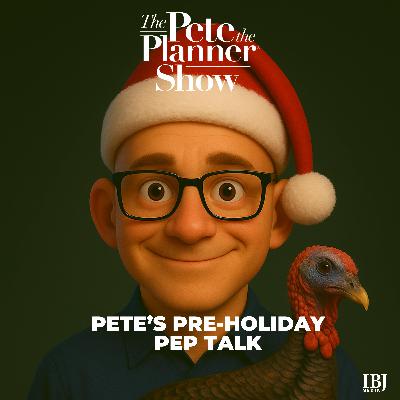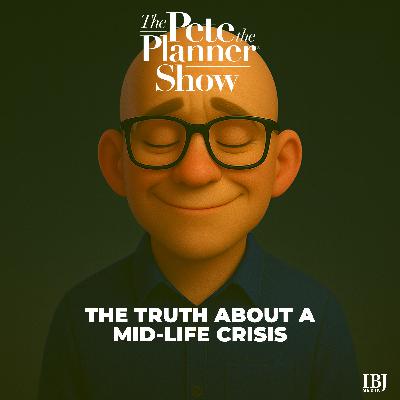Discover The Pete the Planner® Show
The Pete the Planner® Show

The Pete the Planner® Show
Author: IBJ Media
Subscribed: 1,078Played: 33,310Subscribe
Share
© 868329
Description
Discussing money can be emotionally charged, but not here on the Pete the Planner® Show where Personal Finance Expert, former comedian, and author Peter Dunn breaks down personal finance with humor, practical advice, and real-life scenarios to help you make smarter money moves. Pete and his co-hosts Kristen and Damian lead a guilt-free discussion of budgeting, investing, retirement planning, and any number of other topics meant to help you thrive in the present and future. Part of the IBJ Media Podcast Network.
495 Episodes
Reverse
You can now bet on inflation, elections, interest rates, wars, and whether the Fed blinks—and people are calling it “information,” not gambling.
This week on The Pete the Planner Show, we dig into prediction markets: what they are, why they’ve exploded in popularity, and what they really tell us about the economy, politics, and our collective anxiety about the future.
Platforms like Polymarket and Kalshi claim that markets can forecast the future better than polls, experts, or pundits. But can they actually predict what’s going to happen—or are they just pricing fear, confidence, and narrative momentum?
In this episode, we break down:
How prediction markets work (in plain English)
Why they sometimes outperform polls—and when they completely fall apart
The role of incentives, emotion, and thin liquidity
Why “probability” often gets mistaken for “certainty”
What prediction markets get dangerously wrong during volatile moments
Most importantly, we translate all of this into real life. Because while betting on the future can feel productive, it often replaces the boring, effective work of financial planning.
If your financial plan requires you to correctly predict elections, rate cuts, or recessions… your plan is already broken.
This episode isn’t about whether prediction markets are legal, smart, or fun. It’s about what they reveal: not about the future—but about us.
Because fear has always been a terrible financial advisor.
Gold is pulling back. Silver is getting smacked. Tech stocks feel heavy, crypto feels frozen, and investors everywhere are asking the same question: If things are so uncertain, why aren’t the “safe” assets working?
This week, Pete breaks down the psychology of a cranky market — one that isn’t panicking or crashing, but is deeply skeptical and increasingly impatient. We’ll explain why gold can fall even when people are uneasy, why silver drops harder when growth expectations soften, and how rising real yields, industrial demand, and investor fatigue all collide at the same time.
This isn’t fear-driven selling. It’s narrative exhaustion. And understanding the difference matters for how you invest, rebalance, and stay disciplined when markets stop being exciting.
If you’re feeling uneasy, bored, or quietly annoyed by your portfolio right now, this episode is for you.
Did retirement get harder — or did it just change?
A listener writes in with a question a lot of people are quietly asking: Is the kind of retirement our parents and grandparents had even possible anymore? They remember a time when retirement felt automatic — pensions, Social Security, paid-off homes, and far less anxiety about markets or running out of money. Today, even people doing “everything right” feel like retirement is something they have to constantly manage and second-guess.
In this episode, Pete breaks down what actually changed, why retirement feels more fragile now, and what we’re really chasing when we say we want “that kind of retirement.” This isn’t a nostalgia tour or a lecture about saving more — it’s a clear, honest look at how responsibility shifted from institutions to individuals, and what that means for modern households.
If you’ve ever felt like you’re behind despite being responsible — or wondered whether peace of mind is still attainable — this episode is for you.
Because retirement didn’t disappear. The system did.
Jobs are still there. Markets are still standing. Inflation isn’t spiraling.
So why does everything feel… off?
In this episode, Pete the Planner tackles the growing disconnect between what the economic data says and how people actually feel about their money. This isn’t a recession episode—but it’s definitely not a “everything’s great” episode either.
We dig into why households feel financially exhausted even as incomes rise, why good headlines don’t translate into confidence, and how higher prices, frozen decisions, and lingering uncertainty are quietly changing behavior. People aren’t panicking—but they are pulling back. Less splurging. More hesitation. A constant sense of “we’re fine, but only barely.”
The show explores whether this tension is temporary or if we’re entering a new era of permanent caution—where trust takes longer to rebuild than balance sheets, and reassurance alone doesn’t calm nerves. Because maybe the real question isn’t whether a recession is coming…
It’s whether people believe things will actually get easier.
Plus, we close with BWOM and the latest news shaping how all of this plays out in real life.
Nobody wants debt. But sometimes life forces the issue.
In this episode, Pete, Damian, and Kristen tackle a reality most people face at some point: needing cash quickly. This isn’t an endorsement of borrowing and it’s definitely not a how-to. It’s a ranking of consequences—a clear-eyed look at which debt options hurt the least, which ones quietly wreck your future, and which should be avoided almost entirely.
The conversation starts with why people reach for the fastest money instead of the smartest option. Stress, fear, and urgency push otherwise rational people into bad decisions—especially during emergencies, income gaps, or unexpected medical or home expenses. The goal here isn’t perfection; it’s minimizing damage when options are limited.
From there, the team works through a tiered ranking:
The least bad (situational) options, like already-open HELOCs and family loans—tools that can work, but only with serious guardrails and clear boundaries.
The middle ground, including personal loans and 401(k) loans, where predictability and structure help—but behavioral traps and long-term costs still loom.
The high-risk zone, where credit cards, payday loans, and title loans turn short-term problems into long-term financial pain.
Along the way, they break down why “easy” money is usually the most expensive, how minimum payments create dangerous illusions, and why slowing the decision—even briefly—can be the biggest financial win.
If you’ve ever thought, “I just need some cash to get through this,” this episode helps you ask a better question: Which mistake does the least damage—and which ones should never be on the table?
Plus, the episode wraps with BWOM and the latest financial news.
Most Americans believe retirement is just a math problem: invest consistently, ride the market, and everything will work out.
The data says otherwise.
In this episode, Pete digs into new retirement research that reveals a hard truth—retirement success isn’t being derailed by bad investing, it’s being quietly sabotaged by behavior, debt, and timing .
You’ll learn why the vast majority of workers never save enough (even when they think they are), how credit card debt and 401(k) loans silently drain long-term wealth, and why two-thirds of retirees cash out their retirement plans far sooner than expected. Pete also explains why retirement spending is far more unpredictable than most plans assume—and how fear, not extravagance, causes many people to make their most damaging financial decisions right at the finish line.
This isn’t a lecture about stock picking or beating the market. It’s a reality check about how real people actually behave with money—and what you can do now to avoid the most common retirement traps.
If you’ve ever thought, “I’m doing everything right… I think,” this episode is for you.
Pete the Planner's predictions for housing, higher ed, energy and a potential tariff mess
We’re in the midst of the holidays—always a good time for reflection. And this week that means holding Pete the Planner accountable for bold predictions he made in January about the economy and U.S. fiscal policy in 2025. Pete hit a bunch of these out of the park—especially those related to Trumponomics—and he whiffed on several others. Because he’s a big-hearted guy not afraid of making mistakes, Pete this week presents his predictions for 2026, including positive portents for nuclear energy, his advance whiff of a stale housing market and a tough prognosis for higher education. His pick for the biggest story of 2026 might require some advance explanation. The U.S. Supreme Court is expected to decide soon whether President Trump’s emergency tariffs levied earlier this year are invalid. If the justices find that the president exceeded his authority by using emergency powers to impose tariffs on nearly every U.S. trading partner—which, to review, were paid by the companies that imported the products, not the countries or companies from which they came—the importers could be entitled to big refunds. As The Washington Post has reported, unwinding almost a year of Trump’s core economic policy likely could have serious consequences for the government’s finances and on the bottom linesof companies throughout the U.S. economy. It’s impossible to know how much money ultimately would be in play, but estimates of how much the U.S. had collected in emergency tariffs were close to $90 billion when the court heard arguments in early November.
Pete the Planner on Humor, Habits and the Psychology of Money
On this episode of Off the Record, host Nate Feltman sits down with Peter Dunn, better known as Pete the Planner, one of America’s most trusted voices on personal finance. Dunn shares how a sixth-grade stock market contest launched his career, how he blends comedy and financial coaching to help people build better habits, and why the psychology of money matters more than math. He opens up about building Your Money Line, a fast-growing financial technology company using AI to deliver personalized advice to more than 800,000 people, and how leading a startup taught him hard-earned lessons about leadership, responsibility and giving back. A former columnist for USA Today and author of 10 books, Dunn discusses his national media presence, his roots in Indianapolis, and why financial wellness is critical in today’s workplace.
Let’s be honest: most New Year’s resolutions don’t make it to Valentine’s Day.
So instead of pretending this year will be different, we’re drafting financial resolutions that actually survive real life.
In this episode, we run The Financial Resolution Draft—fantasy-football style—selecting the smartest, most realistic financial moves for three life stages: your 20s, your 40s with kids, and your 60s nearing retirement.
No vague goals. No financial TikTok nonsense. No personality changes required.
Just one system per life stage that reduces stress, works with the money you already make, and doesn’t fall apart the first time something goes wrong.
Because if your resolution needs motivation, it’s already dead.
In this week’s episode, Pete breaks down the ten biggest financial mistakes Americans are making right now — from investing too little and too late, to overspending on housing, to making car decisions that haunt their budgets for years. With the economy shifting under everyone’s feet, these missteps are more common (and more costly) than ever.
Pete walks through why these mistakes happen, what they really cost you over time, and the simple, practical changes that can keep your financial life from drifting off-course. If you’ve ever wondered whether your biggest threat is debt, bad timing, or Future You procrastinating… this is the episode to reset your path.
Bite-sized, honest, and packed with clarity — this is your roadmap to avoiding the pitfalls that hold most households back.
This week on The Pete the Planner Show, we tackle a classic early-retirement temptation: what happens when you want out of the workforce before 59½, but almost all your money is locked inside qualified retirement accounts?
A listener from Dayton writes in with solid savings, a paid-off home, and a serious case of “I can’t do this job anymore.” The problem? He wants $80,000 a year in retirement income, but he’s only 54 — and bridging those five and a half years before penalty-free withdrawals is tougher than people think.
We break down his real numbers, explore strategies like 72(t) distributions and Roth conversion ladders, and explain why early retirement is often less about “Can I quit?” and more about “Can I cash-flow the gap years without blowing up my future?”
If you’ve ever dreamed of early retirement (or Googled ‘how bad is the 10% penalty really?’), this episode is for you.
Pete and Kristen read a listener email who seems to indicate they greatly regret their recent home purchase
This week on The Pete the Planner Show, Pete, Damian, and Kristen dive into one of the most universal workplace mysteries: why everyone treats HR like a certified financial planner… even though HR can barely tell you which parking pass to choose without checking a binder.
Open enrollment, confusing benefits forms, retirement questions—employees fire all of it straight at HR hoping for guidance, clarity, or honestly just someone to make the decision for them. And while HR can walk you to the forms, they definitely cannot walk you through your medical history, risk tolerance, or whether your spouse is accident-prone.
In this episode, we break down:
Why HR gets stuck with financial questions in the first place
The top “Please do not ask HR this” questions (yes, including the 401(k) ones)
What HR is actually allowed to help you with
How to get real answers without putting your HR team in legal jeopardy
If you’ve ever stared at a PPO vs. HDHP page like it was ancient hieroglyphics—or asked HR which investments you should pick—this one’s for you. And for HR professionals everywhere: you’re welcome.
As the calendar barrels toward its final pages, Pete sits down for a solo episode to talk about the strange, sloppy, wonderful chaos of the year’s final weeks. From an economy that can’t decide what mood it’s in, to holiday spending that threatens to turn December joy into January regret, Pete breaks down what Americans are really wrestling with right now — and how to keep your financial head on straight while everything else gets weird.
In classic Pete fashion, he mixes practical advice with self-deprecating humor, heartfelt reminders, and a gentle nudge toward sanity. If you're feeling behind on your goals, confused by the markets, or tempted to buy your nephew a $400 gaming headset “because it’s the holidays,” this is your permission to slow down, reset, and approach the end of the year with clarity instead of chaos.
A funny, grounding, down-to-earth episode for anyone trying to finish the year strong — or at least finish it without crying into their January bank statement.
On this week’s episode of The Pete the Planner Show, Pete tackles what might be the most misguided “solution” to housing affordability ever pitched: the 50-year mortgage. On the surface, it sounds like a clever way to make homes more affordable — smaller payments, easier approval, and a chance for more people to buy. But dig a little deeper, and it’s clear this “innovation” is really a long-term financial trap. Pete breaks down the math, explores who really benefits, and explains why stretching your loan to half a century could make you the bank’s favorite customer — and your future self’s worst enemy.
This week, Pete is joined by veteran podcaster and political enthusiast Chris Spangle to wrestle with the myth and the muscle of willpower. Why do we think it’s the key to every success story—money, fitness, food, or habits—when in reality, it often lets us down? Pete and Chris explore how environment, emotion, and even exhaustion can overpower our best intentions. From political discipline to personal finance, from calorie tracking to credit card restraint, they break down what really drives behavior—and why relying on sheer willpower alone is like trying to bench press your way out of bad decision-making.
Funny, honest, and occasionally self-incriminating, this episode will make you rethink how you “control yourself” and maybe show a little more grace when you can’t.
Forget the convertible and the questionable haircut — the real midlife crisis happens when you open your retirement account and realize the math isn’t mathing. In this solo episode, Pete explores the emotional and financial crossroads that hit in your 40s and 50s — when time feels shorter, careers plateau, and money goals start bumping into real life.
He unpacks why financial growth slows down, how priorities shift, and what to do when your sense of progress feels stuck on pause. From redefining success to right-sizing your lifestyle, this episode is part therapy session, part pep talk, and entirely relatable.
Key takeaway: Your midlife crisis isn’t a breakdown — it’s a recalibration.
Most people don’t know how to tell if their financial advisor is great—or just great at sounding confident. In this episode, Pete and Dame unpack the real red flags to watch for when you’re getting financial advice… without turning it into a witch hunt.
They’ll break down the difference between a bad actor and a bad fit, decode advisor-speak (“We’ll rebalance with a tactical overlay!”), and show you how to spot when someone’s more interested in selling than solving. Plus, they’ll explain what good advice actually feels like—clear, consistent, and curious about your life.
This isn’t an “advisors are evil” episode. It’s a smarter take on how to protect yourself and still believe in the power of good guidance.
💥 This week, Pete and Damian face off against their newest (and possibly most intimidating) competitor: Artificial Intelligence.
Can two seasoned money nerds outthink an algorithm? In each round, Pete or Dame tackles a real financial dilemma — from whether to raid an emergency fund to pay off debt, to deciding between a Roth or traditional 401(k). Then, they read the AI’s answer and debate which response wins on accuracy, empathy, and practicality.
It’s human experience versus machine logic — and the results might surprise you. Who gives the better advice: the pros with decades of experience or the robot with instant access to infinite data?
Tune in for laughs, sharp insights, and a fresh look at the future of financial guidance.
🎧 Featuring rounds like “The Credit Card Conundrum,” “The Roth Riddle,” and “The College Crunch.”
👾 Man. Machine. Money. Only one can win.
Ever notice how the smartest people you know sometimes make the worst financial decisions? In this episode, Pete Dame unpack why intelligence doesn’t always translate to good money habits. From overconfidence and analysis paralysis to emotional blind spots and ego-driven decisions, we explore the psychology behind financial self-sabotage.
We’ll share real-life examples of “smart” money mistakes — from chasing complex investments to ignoring basic budgeting — and discuss why simplicity often wins. Plus, we’ll reveal the subtle ways our brains trick us into believing we’re the exception to every financial rule.
💡 Being smart with money isn’t about IQ — it’s about self-awareness.






















The nasally inhales are brutal on the radio, Pete.